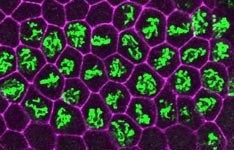Research
Overview

The growth and development of all multi-cellular organisms requires exquisite control of the cell cycle, the orderly process of events during which chromosomes are duplicated during “S” or synthesis phase and segregated to daughter cells during “M” or mitotic phase when cell division occurs. While much is known about the core cell cycle machinery required for the proliferation of single celled microbes and individual mammalian cells in culture, much less is known about how cell cycles are modulated to achieve the coordination necessary for the development of complex multicellular organisms. Failure to achieve proper coordination contributes to inappropriate cell death, developmental failure, genome instability, and oncogenesis.
We study this topic using the fruit fly Drosophila melanogaster because genes controlling the cell cycle in humans and fruit flies function in essentially the same way. This allows us to exploit certain advantages that Drosophila has as a research tool, including the ease with which genetics (making and analyzing mutants) and cell biology (using microscopy to observe cell behavior) can be applied to the study of gene function in the context of a whole animal. Most of the genes that we study function in regulatory pathways that become defective in human cancers. The hope is that by understanding how these genes function in normal Drosophila development we will obtain clues about how they malfunction in the deregulated growth typical of cancer.
Current Research Emphasis
Our current research efforts are divided into three areas: